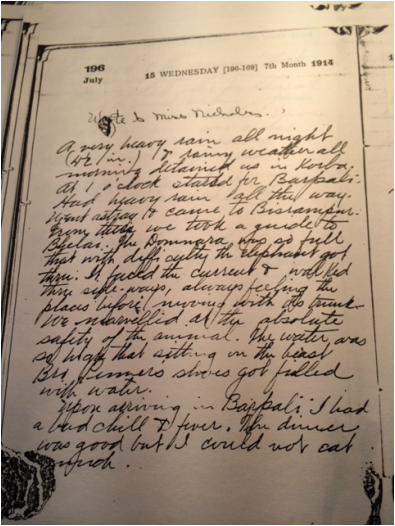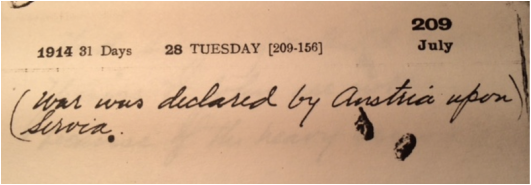One hundred years ago today on July 28, 2014, Austria-Hungary invaded Serbia, beginning World War I. Other war declarations would follow soon afterwards as partners in alliances made good their promises to fight together. The precipitating cause was the assassination of Archduke Franz Ferdinand of Austria in Sarajevo exactly one month before. But long before that event European nations had been forming alliances and plotting strategy for a war that had already seemed not only inevitable, but even desirable.
As Barbara Tuchman shows in Guns of August, her classic account of the beginnings of the war, military strategists in Germany, France, England, and elsewhere were preparing for war with as much relish as international sports teams preparing for a game-- and with seemingly little concern for the inevitable loss of life.
My father was about four years old in July of 1914. He was living in India, near Bilaspur, where his father was a missionary and director of a leper asylum. Grandfather Herman Suckau wrote twenty volumes of diaries between 1910 and 1930, his years in India. The entries during the years leading up to the war portray a region of the country that was primitive by any standard. He travelled from place to place on unpaved roads, bringing along a large tent for lodging, and seeking food from villagers along the way. Sometimes to hunt and to meditate he wandered into the jungle on simple trails. The Indians who knew him referred to him as "The Man Who Walks in the Jungle and is Not Eaten by Tigers."
Reviewing his diaries this summer with the help of a research assistant, Cory Carpenter, I was especially interested in his perspective on the outbreak of a war that would consume millions of lives around the globe. How quickly would the news of major events in Europe reach his remote corner of India, and to what extent would they capture the attention of a young missionary deeply engaged in his profession as preacher and doctor?
He made no mention of the assassination in Sarajevo and the ultimatums that followed in its wake. For him the major event of July, 1914, was local, the torrential rains that dropped several feet of water in that part of India, swelling the rivers, and making travel all-but-impossible. On July 15 he and a fellow missionary, "Brother Penner," travelled by elephant from Korba to Barpali. He wrote this description:
A very heavy rain all night (4 1/2 inches) and rainy weather all morning detained us in Korba. At 1 o'clock started for Barpali. Had heavy rain all the way. Went astray and came back to Bisrampur. From there we took a guide to Bhelai. The Domnari [River] was so full that with difficulty the elephant got thru. It faced the current and walked thru side-ways. Always feeling the places before moving with its trunk. We marveled at the absolute safety of the animal. The water was so high that sitting on the beast Brother Penner's shoes got filled with water.
Note the ravages of bookworms on the original diary over the decades.
(It turns out that Grandfather Suckau was getting his news from The Statesman, an English-Language newspaper that began publishing in India in 1875 and is still publishing to this day.)
During the next four years the war would take more than 30 million lives. My own family in India was never in peril, but their lives were somewhat complicated by being second-generation German-Americans living in an India that was then governed by Britain. I'm planning to review the diaries during the centennial of the war itself, learning more about my own father's story during those years. Hopefully, I'll find other diary entries worth sharing.
In the mean time, I'll remember July of 1914 for the beginning of the Great War -- and for the story of that resourceful elephant crossing a swollen river in India, using his trunk to find his footing.
(You know you want to!)
If you enjoyed this article on World War I, you might also enjoy these entries:
"Over There": World War I Veterans Sing Songs of the Great War, 67 Years Later
•Memories of the Lafayette Escadrille at the American Cathedral in Paris




 RSS Feed
RSS Feed